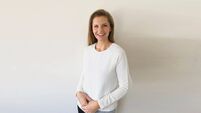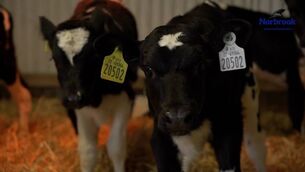'What I learned during my 42 years as a neonatal nurse'

"Babies are always hungry and while they may look tiny and fragile they can cope with a lot more than we think. Their sense of survival is innate and powerful,” says Margaret O’Driscoll, who recently retired after a long career as a midwife.
“I think what I learned most of all is just how strong and resilient women really are.”
Cork midwife Margaret O’Driscoll says she was privileged to help women go through the miracle of birth, to share with them one of the most intimate and life-changing moments on a daily basis.
She recalls: “Ironically, the one place I did not want to work starting out aged 22 was the neo-natal ward simply because I was terrified because babies aren’t able to tell you what’s wrong with them.
"But, of course, I learned very quickly that babies are so very clever. They screech if they have an empty tummy, a dirty bum or a pain in their tummy. Once these things were sorted they were very content and happy. I always say it really is amazing how a tiny baby can go through a long labour and within a few minutes find its own way to the breast to feed.
"They are always hungry and while they may look tiny and fragile they can cope with a lot more than we think. Their sense of survival is innate and powerful.”

A mum of five, Margaret lives in Kilbrittain in West Cork. She retired from Cork University Maternity Hospital (CUMH) in May 2021 having worked as a neonatal intensive care nurse for 42 years.
She spent 27 years in the neo-natal unit in the Erinville in Cork city and then 15 years in the CUMH. In both hospitals, she earned a special place in the hearts of the thousands of parents whose babies she cared so lovingly for.
She says her advice to nurses starting out remains the same: “My advice would always be to be patient and tolerant with people. A sense of humour goes a long way. Sometimes people just want you to sit with them and if you listen you will be amazed what comes out and you can help them with their worries. Everybody worries. It is good to talk and let people get whatever it is off their chest.”
Margaret began her career in what is now Waterford University Hospital back in 1975, before training as a midwife in Kirkcaldy in Scotland and returning to her native Cork to embark on her career proper.
After an initial year or two, Margaret found her stride, and quickly realised that she never wanted to leave neo-natal. “I can honestly say that there was never a day I didn’t want to come to work,” she said.
A mother of five ranging in ages from 36 to 27 (four of whom she had in four and a half years!) Margaret is married to Willie, a farmer.
The immense job satisfaction motivated her to always go that extra mile for the babies in her care. She was known for routinely giving her phone number to parents when their babies were being discharged, and even offering to babysit for them on days off.
Margaret naturally admits that some days were harder than others in the unit that can cater for 55 babies at its busiest but more usually treats around 37. Not every story has a happy ending there.
“Parents are naturally so distracted when they meet us here, it’s generally the last place they expect to be, and it’s a place they usually never even knew existed, so we have to look after them as well as the babies. Today thankfully there are so many advances and we can save so many little babies even as young as 23 weeks and we were able to keep them alive because the technology is there to bring them along”.
Three years ago Margaret faced her own health challenge when she was diagnosed with breast cancer during a routine mammogram, which she describes as “a really frightening time”.
“I hadn’t felt anything myself and I had been feeling fine. Then, when the lump was found to be cancerous, I was really nervous,” she recalls.
Margaret underwent radiotherapy and was off work for a period of six months at the time.
“My consultant said that I’d never have found that lump myself. Someone must have been praying for me,” she said, urging all women to attend their routine mammograms.
Margaret will turn 65 this year and her illness did play a role in her decision to retire early.
“My eldest daughter said to me that maybe it was time to go. And after my radiotherapy I did find myself more tired. I really loved my time at CUMH so much. I have such admiration for the really amazing and terrific staff. There is a great sense of camaraderie there.”
Her advice to any parent who finds themselves in the neo-natal unit is not to think too far ahead.
“Take it day by day and don’t look too far ahead. Some days will be good and some won’t but they’ll balance out and don’t be afraid to ask questions”.
Naturally, there are very traumatic and stressful times.
“I grieved for every pregnancy that went wrong. When things go wrong, whether it’s planned or a shock, it has a profound effect on the medical team also every time. It can be really hard after building such strong relationships with the couples.
"We have to stay strong for the parents. We have to remain professional whatever happens, even when it’s the worst-case scenario. We support the parents and continue doing our job but behind the scenes we are often breaking too.”
It is so important she said for mums and dads to spend as much time as possible with their babies, giving them skin-to-skin contact, touching them and talking to them.
This reduces babies' stress levels, helps their immune systems develop and gets them safely on the road to healthy growth. This is crucial even with babies who need special care and can’t be with their parents all the time.












